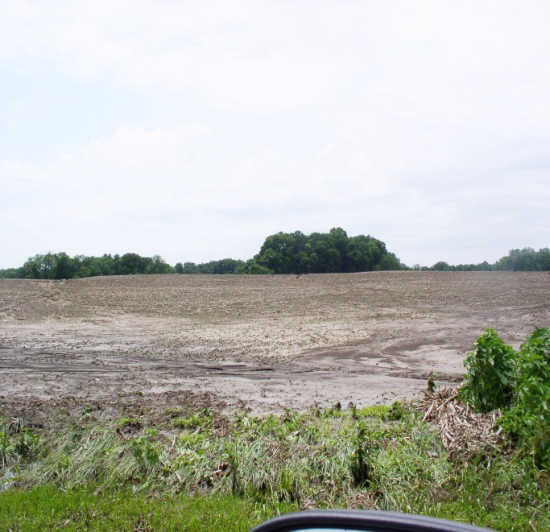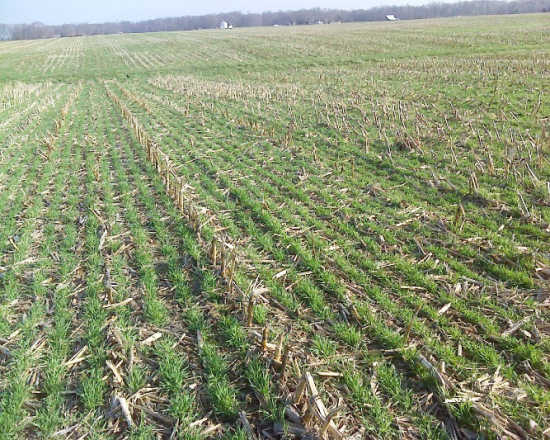Why you should be concerned about the soil health of your farm

This article is addressed to landowners, those of you who own cropland and rent it out either on a share arrangement or receive cash rent for a tenant to farm it. I welcome anyone reading it, but I especially would like landowners to read it, ponder my points and consider how you would like to react and respond to it.
Folks, what is the most important point of discussion when you talk over your farm with your tenant? Are you tempted to change tenants when offered a few more dollars of cash rent? Do you discuss how your land will be farmed or just settle on the bottom line? What conditions do you require in your cash rent contract, or better yet do you have a contract? Do you review soil test results to insure that nutrient levels are staying at acceptable levels? Do you care what kind of tillage your tenant uses on your farm? Do you know how tillage can impact the productivity potential of your farm?
Your farm land can be compared to a savings account, if you withdraw more money than you deposit and earn on interest, sooner or later the account is empty. Much of the farmland in the Midwest has been farmed such that more is being withdrawn than is being deposited, the account is being drawn down, and productivity is being lost. What can be or better yet, what must be done to turn your account into one that is increasing instead of decreasing in value.
The key to long term soil productivity and resilience is organic matter contained in the soil. The higher the level of soil organic matter, the easier it is for the soil to make nutrients available for a crop to use. The higher the level of soil organic matter, the more resilient the soil is to extreme changes in weather conditions. From the time our land was converted from forest or prairie to cropland, soil organic matter levels have been dropping. The primary culprit is tillage which allows the soil organic matter building Carbon to burn off when exposed to the air. How can you tell what the soil organic matter levels are on your farm? Ask to see soil test results or better yet check the color of your topsoil. In general, the darker the color of the topsoil, the higher the soil organic matter level.
When you take a drive around your farm or if you look out over your farm as you sip your morning coffee, what do you see? Do you see a field that has been fall tilled with very little if any crop residue to protect the soil surface? Do you see gullies that have formed after heavy rains in fields that have no armor to protect them? Do you see large areas of water standing because tillage has caused compaction or lack of soil structure that reduces the soil's ability to have water infiltrate?
Or do you see something totally different? Your fields are covered with undisturbed residue from last year's harvest. Grass waterways and field borders have been installed to control runoff. Maybe best of all, as you celebrate Christmas, your cropland is a green carpet of fall planted cover crops, protecting the soil, collecting unused nutrients, and feeding the microbiology below the surface.
Now that you have taken a look at your farm, do you like what you see? Would you like to see something different, would you like to suggest changes? Why don't we talk about what you, the owner of the farm can do.

1. You are the owner, it is your land. You have the right to suggest changes and you have the right to request changes.
2. You may have to compromise with your tenant. Changes may mean you agree to a lessor cash rent payment while change is being implemented.
3. You may have to return part of your cash rent payment back to the farm. Investing in drainage, lime, and cover crops will provide a return on your investment, improve productivity, and make your farm more valuable.
4. If you would like to see cover crops growing on your farm through the winter, offer to help your tenant with the cost.
5. Maybe the most important thing, You need to be involved in how your farm is operated. That land is your bank account, and the bank account of your future generations.
The soils of Indiana are one of if not the most precious of natural resources that we have. The ability to grow food, fiber, and fuel is important to today's citizens, but as the population of the world increases and available cropland decreases, it will be exponentially more important to our grandchildren in years to come. I encourage You, no I challenge You as a landowner to become more involved in the management of your farm. Talk to your tenant about how together you can leave your soil in better heath for your children and grandchildren than when you took over as steward of your farm!
For more information on improving the Soil Health of your farm contact your local office of the Natural Resources Conservation Service at 653-5716, extension 3.
